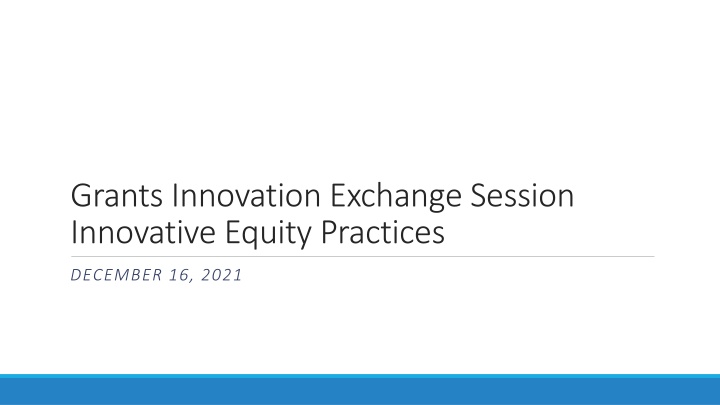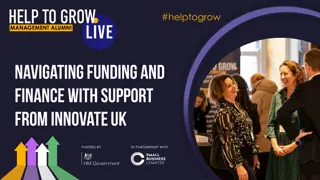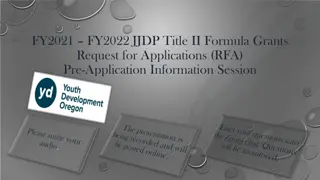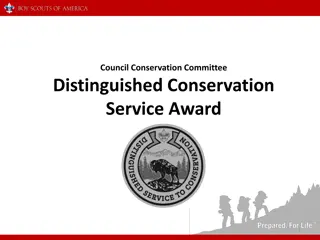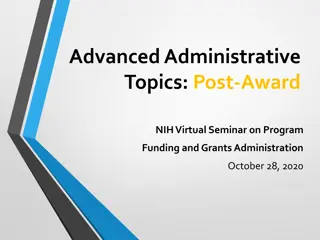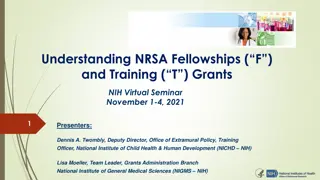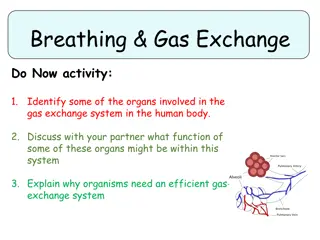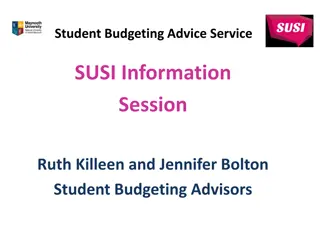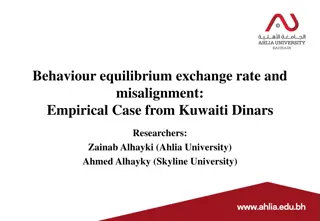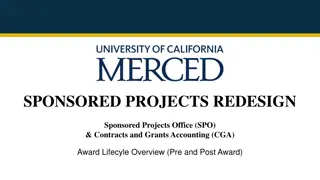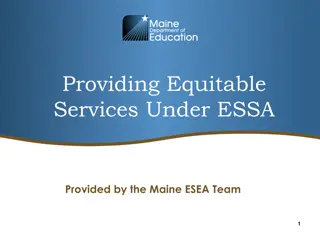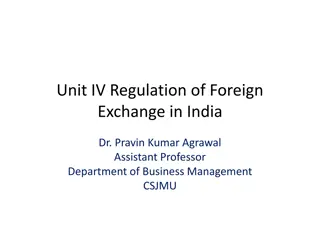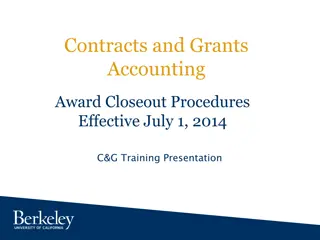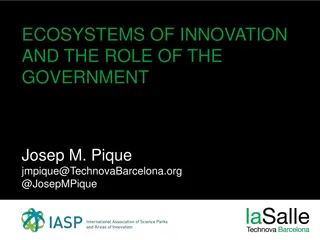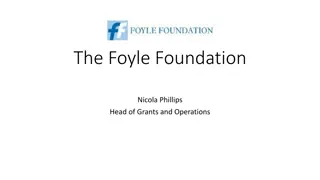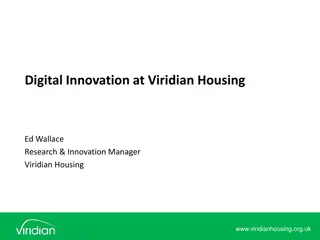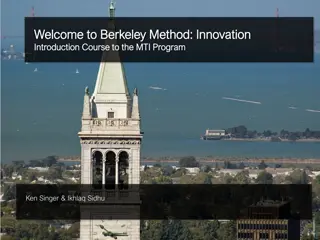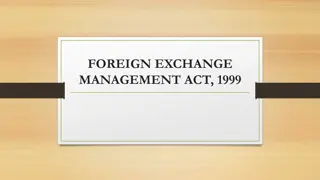Grants Innovation Exchange Session on Equitable Award Practices
Laura Watson and Lynn Rhinehart from the Department of Labor, along with Lynn Overmann from the USDA, discuss the impact of eligibility criteria on equitable outcomes of awards. They also share innovative practices related to the recent Controller Alert and OMB guidance, emphasizing the inclusion of various types of eligible nonprofit organizations. The session aims to provide insights and address questions on this important topic.
Download Presentation

Please find below an Image/Link to download the presentation.
The content on the website is provided AS IS for your information and personal use only. It may not be sold, licensed, or shared on other websites without obtaining consent from the author.If you encounter any issues during the download, it is possible that the publisher has removed the file from their server.
You are allowed to download the files provided on this website for personal or commercial use, subject to the condition that they are used lawfully. All files are the property of their respective owners.
The content on the website is provided AS IS for your information and personal use only. It may not be sold, licensed, or shared on other websites without obtaining consent from the author.
E N D
Presentation Transcript
Grants Innovation Exchange Session Innovative Equity Practices DECEMBER 16, 2021
Todays presenters Laura Watson, Administrator, Office of Grants Management, DOL Ms. Laura Patton Watson has extensive experience in all phases the federal assistance arena with the Department of Labor. Initially, she worked under the Assistant Secretary for Administration & Management in the Division of Cost Determination overseeing indirect costs rate negotiations. After 12 years in ASAM, she moved to the Employment & Training Administration where she has overseen all aspects of grant grants management from solicitations to closeout/audit. Ms. Watson currently represents the Department on the Grants Executive Board under the guidance of the Office of Management & Budget and has participated in a number of other cross agency workgroups. In 2016, Laura was named the Administrator of the Office of Grants Management. Laura is a graduate of North Carolina State University, the Federal Executive Institute and the John F. Kennedy School of Government. Laura is also a licensed CPA in the District of Columbia and resides in Arlington, VA with her husband, two children and two dogs. Lynn Rhinehart, Senior Advisor, DOL Lynn Rhinehart is a Senior Advisor at the U.S. Department of Labor, where she assists the Secretary of Labor in his role as Vice Chair of the White House Task Force on Worker Organizing and Empowerment, established by Executive Order 14025. Until her appointment at the Labor Department, Lynn was a Senior Fellow focused on labor policy, unions and collective bargaining at the Economic Policy Institute, a Washington, D.C.-based think tank that provides research and analysis on economic issues as they affect working people. She served as Special Counsel to Actors Equity, the union for stage actors and stage managers and consulted with labor organizations on a variety of union issues. Until July 2018, Lynn was General Counsel of the national AFL-CIO, a federation of 56 national and international labor unions, and executive director of the AFL-CIO Union Lawyers Alliance, a national organization of 2,100 union-side labor lawyers.
Todays presenters Lynn Overman, Senior Advisor, USDA Lynn Overmann currently serves as Senior Advisor for Data and Technology in the U.S. Department of Agriculture. At USDA, Lynn helps lead work to ensure the equitable delivery of services, to effectively leverage data to address climate change, and to modernize programs that provide critical support to America s farmers and rural entrepreneurs. Prior to USDA, Lynn was the Senior Data Strategist at Opportunity Insights, a research and policy institute based at Harvard University that focuses on improving economic opportunity. During the Obama Administration, served as a Senior Policy Advisor to the U.S. Chief Technology Officer in the White House Office of Science and Technology policy, where she created and launched the Data-Driven Justice initiative. Lynn also served in senior policy positions at the U.S. Department of Justice and as Deputy Chief Data Officer in the U.S. Department of Commerce. Prior to joining the federal government, Lynn was a civil rights attorney and public defender in Miami, Florida.
Objectives 1. Discuss the impact that thoughtful use of eligibility criteria can have on equitable outcomes of awards. 2. Learn about the recent Controller Alert and underlying OMB guidance to agencies to carefully consider various types of eligible nonprofit organizations and conduct outreach to potential applicants. 3. Learn about innovative practices that DOL and USDA are doing to implement the Controller Alert. 4. Provide a forum for questions and answers related to the topic.
White House Task Force White House Task Force on Worker Organizing and Empowerment on Worker Organizing and Empowerment
Controller Alert --Applicant Eligibility for Financial Assistance and Types of Nonprofit Organizations (e.g., Labor Organizations and Neighborhood Associations) Issued on November 5, 2021 https://www.cfo.gov/wp- content/uploads/2021/11/ControllerAlertApplicantEligibilityForFinancialAssistanceAndTypesOfNonprof itOrganizations.pdf
Key Takeaways from the Controller Alert The importance of properly identifying all eligible applicants for Federal financial assistance awards, for example 501(c) 4 or 501(c) 5 nonprofit organizations that are labor unions, neighborhood associations, or other types of eligible organizations, including those that reach or represent potentially underserved communities. At the program planning and design stage, agencies should review statutory authorizing language to determine the broadest range of eligible organizations, and ensure that these are explicitly reflected in their Assistance Listings on SAM.gov. Agencies should review their outreach and stakeholder engagement plans to be sure that awareness of publicly posted notices of funding opportunities appropriately reaches potentially interested audiences. This should include targeted outreach to entities that may have been excluded in the past, such as labor organizations. Actively consider the full range of potentially eligible applicant types when formulating new and managing long-established programs.
WORC 3 included requirements for at least 2 employer/industry representatives and added labor unions/labor management partnerships to the list of the potential partners. In addition to the two types of required partners, partnerships may include, but are not limited to: local and regional employer/industry networks; local economic development organizations; local governments; regional planning organizations; labor unions or labor management partnerships; institutions of higher education and other job training and adult education providers; supportive and human services providers; and other relevant community, economic and workforce development partners.
A. ELIGIBLE APPLICANTS Eligible applicants for these grants are public or private non-profit agencies. These organizations include rural, urban, or Native American agencies that have previously served disadvantaged youth in a YouthBuild or other similar program. These agencies or organizations may include, but are not limited to, the following: Community and faith-based organizations including those with IRS 501(c)(3) non-profit status; An entity carrying out activities under WIOA, such as a local workforce development board or one-stop career center partner program; Labor unions, labor-management partnerships, a central labor council, other labor council, state conference of a union, or state labor federation, or worker centers; Educational institutions, including a local school board, public school district, or community college; A community action agency; A state or local housing development agency; Any Indian and Native American entity eligible for grants under Sec. 166 of WIOA, including federally and other than federally-recognized Tribes, Native American non- profit organizations, and Native Hawaiian and Alaska Native organizations; A community development corporation; A state or local youth service conservation corps; and Any other public or private non-profit entity that is eligible to provide education or employment training under a federal program and can meet the required elements of the grant.
Summary 1. The Controller Alert Applicant Eligibility for Financial Assistance and Types of Nonprofit Organizations (e.g., Labor Organizations and Neighborhood Associations) was issued on November 5, 2021 for agency implementation. https://www.cfo.gov/wp-content/uploads/2021/11/ControllerAlertApplicantEligibilityForFinancialAssistanceAndTypesOfNonprofitOrganizations.pdf 2. Agencies are already taking steps to implement this Controller Alert, as seen today by DOL and USDA. 3. We look forward to further discussion on this topic.
Questions? USE THE RAISE HAND FEATURE
Thank you! PLEASE REACH OUT TO THE GRANTS TEAM AT GRANTSTEAM@OMB.EOP.GOV WITH ANY FOLLOW-UP QUESTIONS.
